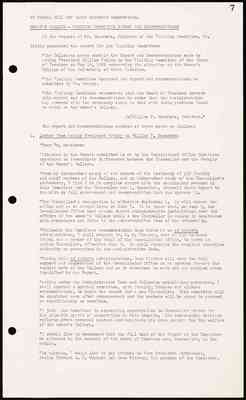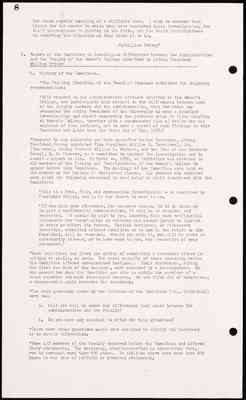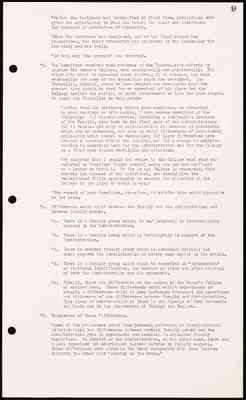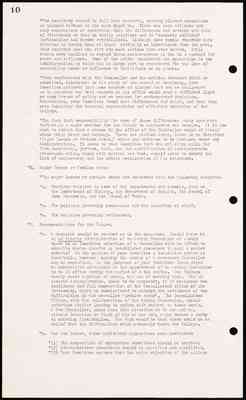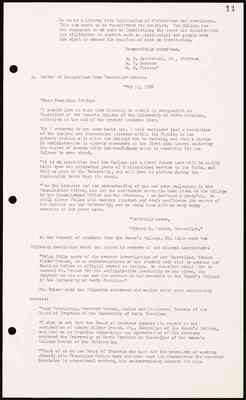Pages
7
at Chapel Hill for their splendid cooperation.
WOMAN'S COLLEGE - VISITING COMMITTEE REPORT AND RECOMMENDATIONS
At the request of Mr. Saunders, Chairman of the Visiting Committee, Mr. Friday presented the report for the Visiting Committee:
"The following pages contain the Report and Recommendations made by Acting President William Friday to the Visiting Committee of the Board of Trustees on May 16, 1956 concerning the situation at the Woman's College of the University of North Carolina.
"The Visiting Committee approved the report and recommendations as submitted by Mr. Friday.
"The Visiting Committee recommends that the Board of Trustees approve this report and its recommendations in order that the Administration may proceed with the necessary steps to deal with those problems found to exist at the Woman's College.
/s/William P. Saunders, Chairman."
The report and recommendations consist of three parts as follows:
1. Letter from Acting President Friday to William P. Saunders:
"Dear Mr. Saunders:
"Attached is the Report submitted to me by the Consolidated Office Committee appointed to investigate differences between the Chancellor and the Faculty of the Woman's College.
"From my independent study of the record of the testimony of 132 faculty and staff members of the College, and my independent study of the Chancellor's statements, I find I am in complete accord with the conclusions reached by this Committee and the Chancellor and I, therefore, transmit their Report to you with my full endorsement and recommendation that you approve it.
"The Chancellor's resignation is effective September 1. He will vacate the office and go on earned leave on June 5. It is clear that, on June 5, the Consolidated Office must assume direct administrative jurisdiction over the affairs of the Woman's College until a new Chancellor is chosen in accordance with procedures set forth in the Administrative Code of the University.
"Following the Committee recommendation that there be an ad interim administration, I shall request Dr. W. W. Pierson, Dean of the Graduate School and a member of the staff of the Consolidated Office, to serve as Acting Chancellor, effective June 5. He shall exercise the complete executive authority as prescribed in the Administrative Code.
"During this ad interim administration, Dean Pierson will have the full support and cooperation of the Consolidated Office as he carries forward the regular work of the College and as he endeavors to work out the problem areas identified in the Report.
"Acting under the Administrative Code and following established precedent, I shall appoint a special committee, with faculty, Trustee and alumnae representation, to begin the search for a new Chancellor. This committee will be appointed soon after commencement and the members will be urged to proceed as expeditiously as possible.
"I join the Committee in expressing appreciation to Chancellor Graham for his splendid spirit of cooperation in this inquiry. His commendable decision reflects great personal courage and manifests his deep concern for the welfare of the Woman's College.
"I should like to recommend that the full text of the Report of the Committee be released to the members of the Board of Trustees and, thereafter, to the public.
"In closing, I would like to pay tribute to Vice President Carmichael, Acting Provost W. M. Whyburn and Dean Pierson, the members of the Committee,
8
for their capable handling of a difficult task. I wish to commend them, highly for the manner in which they have conducted their investigation, for their thoroughness in getting at the facts, and for their forthrightness in reporting the situation as they found it to be.
/s/William Friday"
2. Report of the Committee to Investigate Differences between the Administration and the Faculty of the Woman's College submitted to Acting President William Friday
"A. History of the Committee.
"The Visiting Committee of the Board of Trustees submitted the following recommendation:
'With respect to the Administrative problems existing at the Woman's College, and particularly with respect to the differences between some of the faculty members and the administration, this Committee has requested the Acting President of the University to make a detailed investigation and report concerning the problems which he finds existing at Woman's College, together with a recommended plan of action for the solution of such problems, and to make a report of such findings to this Committee not later than the first day of May, 1956.'
"Pursuant to the authority and duty specified in the foregoing, Acting President Friday appointed Vice President William D. Carmichael, Jr. (Chairman), Acting Provost William M. Whyburn, and the Dean of the Graduate School, W. W. Pierson, as a committee to conduct the investigation and to submit a report to him. On March --, 1956, an invitation was extended to all members of the faculty and Administration of the Woman's College to appear before this Committee. The meetings of the Committee were held on the campus on the College in designated places. All persons who appeared were given the following statement to read prior to their interviews with the Committee:
'This is a free, fair, and responsible investigation - as conceived by President Friday, and it is our intent to make it so.
'If you wish your statement, for whatever reason, to be in whole or in part a confidential communication, it will be so received and respected. It should be said to you, however, that such confidential statements are inadmissible as evidence and cannot justly be allowed to enter or affect the report. Factual testimony, of first-hand knowledge, submitted without condition as to use in the report to the President, will be recorded. Should you wish it, you will be given an opportunity to read, or to have read to you, the transcript of your statement.'
"Each individual was given the option of submitting a statement either in writing or orally, or both. The great majority of those appearing before the Committee offered unrestricted testimony. Their statements, during the first two days of the hearings, were recorded by a stenographer. On the second two days the Committee was able to obtain the services of a court reporter who made stenotyped records. On the fifth day of interviews, a stenographer again recorded the testimony.
"The main questions asked by the Chairman of the Committee (Mr.. Carmichael) were two:
a. Will you tell us about any differences that exist between the administration and the faculty?
b. Do you have any solution to offer for this situation?
"There were other questions which were designed to clarify the testimony or to obtain information.
"Some 132 members of the faculty appeared before the Committee and offered their statements. The testimony, when transcribed in typewritten form, ran to somewhat more than 600 pages. In addition there were more than 600 pages in the form of exhibits or prepared statements.
9
"Before the testimony was transcribed in final form, individuals were given the opportunity to read the record for their own interviews for purposes of correction or expansion.
"When the testimony was completed, and as the final record was transcribed, the typed transcript was delivered to the Chancellor for his study and his reply.
"In this way 'due process' was observed.
"B. The Committee received much evidence of the Chancellor's efforts to upgrade the Woman's College, both academically and structurally. The vigor with which he executed these efforts, it is thought, has been responsible for some of the opposition which has developed. The Chancellor, himself, seems to have reached the conclusion that the present time should be used for an appraisal of his plans for the College against the setting in which achievement of them has been sought. We quote the Chancellor on this point:
'Having read the testimony before your committee, as presented in your hearings on this campus, I have become convinced of the following: (a) dissatisfaction, involving a substantial fraction of the Faculty, goes back to the first year of the administration; (b) it relates not only to administrative differences or procedures which can be corrected, but also to basic differences of educational philosophy which cannot be reconciled; (c) these differences have created a cleavage within the Faculty; and (d) a change in administration is essential both for the administration and for the College as a first step toward rectifying the situation.
'My decision that I should not return to the College next year was reported to President Friday several weeks ago and was confirmed in a letter on April 5. So far as the College is concerned, this removes the element of the individual, and should give the Consolidated Office opportunity to examine the situation at the College in the light of basic issues.'
"The report of your Committee, therefore, is briefer than would otherwise be the case.
Differences which exist between the faculty and the Administration and between faculty groups.
"a. There is a faculty group which, in our judgment, is irreconcilably opposed to the Administration.
"b. There is a faculty group which is forthrightly in support of the Administration.
"c. There is another faculty group which is adversely critical but which regards the Administration as having some merits to its credit.
"d. There is a faculty group which might be described as 'independent' of factional identification, the members of which are often critical of both the Administration and its opponents.
"e. Finally, there are differences on the campus of the Woman's College of another sort. These differences exist within departments or schools - differences which in some instances transcent the importance and bitterness of the differences between faculty and Administration. This class of controversies is found in the Schools of Home Economics and Music and in the departments of Biology and English.
"D. Background of These Differences.
"Some of the criticisms arose from personal grievance or disappointment. Unfortunately, the differences between certain faculty groups and the Administration grew in importance and resulted in organized faculty opposition. In support of the Administration, on the other hand, there was a less organized but nonetheless planned defense by faculty members. These differences were aired in the local newspapers with each faction charging the other with 'running to the press.'
10
"The testimony tended to fall into patterns, showing planned opposition or planned defense as the case might be. There was some evidence and many expressions of conviction that the differences had severed old ties of friendship so that in social relations and in 'academic politics' factionalism had become crystallized. Although some people regarded this division as having been at least partially an inheritance from the past, they insisted that the rift was more serious than ever before. Still others were inclined to regard these controversies as due to a contest for power and influence. Some of the latter considered the opposition to the Administration as being due in large part to resentment for the loss of controlling power or influence by individuals or by groups.
"From conferences with the Chancellor and the written document which he submitted, subsequent to his study of the record of testimony, your Committee gathered that some matters of alleged fact can be challenged as to accuracy and that records in his office would shed a different light on many issues of policy and on reasons for controverted decisions. Nonetheless, your Committee found that differences did exist, and that they were impairing the internal organization and effective operation of the College.
"The fact that responsibility for some of these differences rests upon each faction is a major problem for the future to ameliorate and resolve. It is too much to expect that a change in the office of the Chancellor would of itself alone bring peace and harmony. There are problem areas, later to be described 'Major Issues or Problem Areas,' which may continue to be problems under any Administration. It seems to your Committee that the situation calls for firm leadership, justice, tact, and the clarification of administrative procedures which, along with patient and time, should serve to remove the fact of controversy and the active recollection of its existence.
"E. Major Issues or Problem Areas
"The major issues or problem areas are concerned with the following subjects:
"a. Problems relative to some of the departments and schools, such as the Department of Biology, the Department of English, the School of Home Economics, and the School of Music.
"b. The policies governing promotions and the selection of staff.
"c. The policies governing retirement.
"F. Recommendations for the Future.
"a. A decision should be reached as to the question: Should there be an ad interim Administration of an Acting Chancellor or should there be an immediate selection of a Chancellor with an effort to expedite choice insofar as established procedure in such a matter permits? In the opinion of your Committee a transition period is inevitable, however quickly the choice of a permanent Chancellor may be expedited. In the judgment of your Committee there might be substantial advantages in the appointment of an Acting Chancellor to be in office during the period of a few months. The College sorely needs a period of peace, but not of marking time. The ad interim Administration, known to be temporary, if it possesses the confidence and full cooperation of the Consolidated Office of the University, might be commissioned to attempt the settlement of the difficulties in the so-called 'problem areas'. The Consolidated Office, with the collaboration of the Acting Chancellor, should undertake studies leading to action with respect to these areas. A New Chancellor, going into this situation as it now exists, without intention or fault of his or her own, might become a party to existing factionalism. The risk would be that there would be no relief from the difficulties which presently beset the College.
"b. For the future, three additional suggestions seem pertinent:
"(1) The composition of appointive committees should be studied. "(2) Administrative procedures should be clarified and simplified. "(3) Your Committee assumes that the major objective of the college
11
is to be a Liberal Arts Institution of distinction and excellence. This aim ought to be re-affirmed and ennobled. The College has the resources to be such an institution; the State has demonstrated its willingness to support such an institution; our people have the right to demand the benefits of such an institution.
Respectfully submitted,
W. D. Carmichael, Jr., Chairman W. M. Whyburn W. W. Pierson"
3. Letter of Resignation from Chancellor Graham:
"May 15, 1956
"Dear President Friday:
"I should like at this time formally to submit my resignation as Chancellor of the Woman's College of the University of North Carolina, effective at the end of the present academic year.
"As I reported to you some weeks ago, I have concluded that a resolution of the serious and deep-seated cleavage within the Faculty is the primary problem with which the College has to contend, and that a chance in administration is clearly necessary as the first step toward achieving the degree of campus unity and confidence which is essential for the College to move ahead.
"It is my conviction that the College has a great future that will be wisely built upon her sixty-four years of distinguished service to the State, and that as part of the University, she will grow in stature during the challenging years that lie ahead.
"For the interest and the understanding of you and your colleagues in the Consolidated Office, and for the assistance which has been given to the College by the Consolidated Office and the Trustees, I am profoundly grateful. We shall always follow with keenest interest and every confidence the course of the College and the University, and we shall take with us many happy memories of our years here.
"Cordially yours,
"Edward K. Graham, Chancellor."
At the request of students from the Woman's College, Mr. Allen read the following resolution which was passed by members of the Student Legislature:
"Being fully aware of the present investigation of our Chancellor, Edward Kidder Graham, we as representatives of the student body wish to express our feelings before an official report is issued. We therefore would like to commend Mr. Graham for the administrative leadership he has given, the judgment he has shown and the service he has rendered to the Woman's College of the University of North Carolina."
Mr. Bryant made the following statement and motion which were unanimously adopted:
"Your Excellency, Governor Hodges, Ladies and Gentlemen, Members of the Board of Trustees of the University of North Carolina:
"I wish to ask that the Board of Trustees express its regret at the resignation of Edward Kidder Graham, Jr., Chancellor of the Woman's College, and that we as Trustees acknowledge our appreciation of his services rendered the University of North Carolina as Chancellor of the Woman's College branch of the University.
"Those of us on the Board of Trustees who have had the privilege of working closely with Chancellor Graham know and have seen him demonstrate his superior knowledge in educational matters, his uncompromising demands for high
